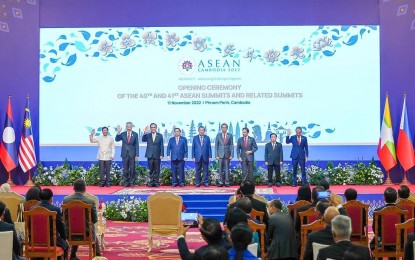
President Ferdinand R. Marcos Jr. and fellow ASEAN leaders in Phnom Penh, Cambodia. (Photo courtesy of the Office of the Press Secretary)
MANILA – President Ferdinand R. Marcos Jr. on Friday emphasized the importance of regional unity to help the Association of Southeast Asian Nations (ASEAN) address present challenges.
Marcos, in his intervention during the 40th Asean Summit Plenary, called on his fellow Southeast Asian leaders to continue creating an "inclusive and resilient" Asean that is conducive to growth and prosperity.
"We now can stand witness to how that small group has evolved not only in number but also in political strength and economic power. We now convene major powers and bring them to the table to discuss significant regional and international issues," he said.
Marcos said Asean solidarity is vital, considering that the member-states are facing several pressing challenges, which include natural disasters, health emergencies, armed conflicts, and economic recessions.
He likewise emphasized the need to reaffirm Asean Centrality to implement mechanisms for the community-building efforts of the regional bloc.
"It is imperative that we reassert Asean Centrality. This in the face of geopolitical dynamics and tensions in the region and the proliferation of Indo-Pacific engagements, including the requests of our Dialogue Partners for closer partnerships,” Marcos said.
"Asean’s response to this is the forward-looking Asean Outlook on the Indo-Pacific, with its essential element of Asean Centrality in the implementation of Asean-led mechanisms, projects, and initiatives for our community building efforts,” he added.
Under the Asean Charter, the principle of centrality focuses on the regional bloc's external political, economic, social and cultural relations while remaining actively engaged, outward-looking, inclusive, and non-discriminatory.
He also called for the reinvigoration of the region’s economies through tourism recovery, energy cooperation, and trade and investment revitalization.
As an economic power, Marcos cited the Asean's establishment of free trade area with a combined gross domestic product and noted the Asean Development Outlook forecast that the regional bloc would surpass the European Union by 2030 to become the fourth largest economy in the world.
He added that the Regional Comprehensive Economic Partnership (RCEP) would help the Asean recover well after the pandemic, as well as make the region "an attractive investment and production center of the global supply chain."
The RCEP is a free trade agreement (FTA) between the 10 Asean member-states and its five FTA partners, which include Australia, China, Japan, New Zealand, and the Republic of Korea.
Marcos likewise stressed the need to further boost the Asean's digital cooperation to improve the region's health care system, as well as to help micro, small and medium enterprises (MSMEs) and other sectors.
He said the region's food security cooperation must also be enhanced by strengthening initiatives and expanding projects under the Asean Ministers of Agriculture and Forestry and other related mechanisms, which also involve its dialogue partners.
“We need to solidify our food resilience and promote food self-sufficiency, through the use of new agricultural technologies, in order to protect the region and our countries from shocks to the global food value chain, as well as against adverse effects of climate change," he said.
To address the climate crisis, Marcos called for the Asean’s "united voice" and the fulfillment of its obligation to attain carbon neutrality by 2050.
The regional bloc, he said, must also continue supporting the Asean Center for Biodiversity in its efforts to conserve, protect, and advocate for the sustainable use of biodiversity and adopt evidence-based approaches to climate change.
This is the first time Marcos participated in the Asean summit as the country's chief executive.
He said he was "deeply honored" to attend the summit, having received a warm welcome from his fellow Asean leaders who acknowledged his presence in their respective speeches. (PNA)
